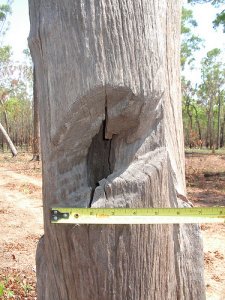by Emily Shepard, Visiting Scholar
Hello, my name is Emily Shepard, and I am an archaeology master’s student from Portland State University in the United States. I am very excited to be at Flinders working with Dr. Mick Morrison on a really interesting topic – culturally modified trees (CMTs). This project focuses on ‘sugarbag’ trees: or CMTs that were scarred through wild honey (sugarbag) collection by Indigenous peoples living in the Weipa region of the northern Cape York Peninsula in Queensland.

A sugarbag scar on an Ironwood tree near Weipa
Although sugarbag collection was almost certainly a part of Indigenous lifeways for many thousands of years, prior archaeological and anthropological research by Dr. Morrison and Dr. Darlene McNaughton suggests that honey procurement strategies shifted substantially in the past century. These changes, which primarily relate to intensification of honey harvest, seem to have been influenced by access to new technology, such as larger axes. However, some of these changes may also reflect strategies of Indigenous peoples for engaging with new economic, social and political conditions arising from the arrival of missionaries. Hopefully, this project will both aid in developing methods for classifying these CMTs, and will shed light on aspects of life of Indigenous peoples living in the region that were left out of the historical record by missionaries.
I’m hoping this project will highlight the potential of data from CMTs to address a variety of interesting and important questions not only in Australia, but also in the United States and Canada. I’m travelling to Weipa with Mick and other students working on a project investigating the history of the mission early next month, and we hope to collect a lot of new information on sugarbag (and other) scarred trees found around the former mission settlement.
This research is funded by the East Asia and Pacific Summer Institute, which is made possible by the United States National Science Foundation and the Australian Academy of Science.

